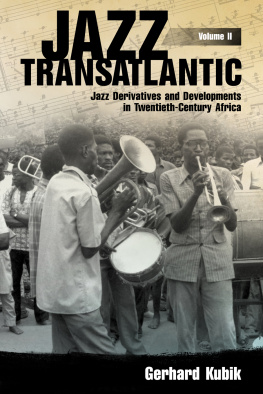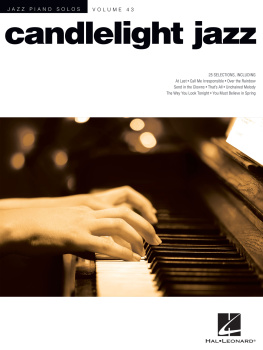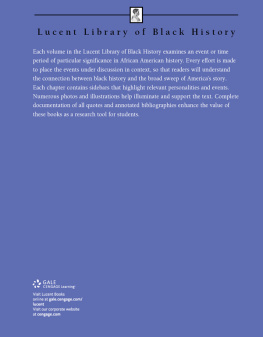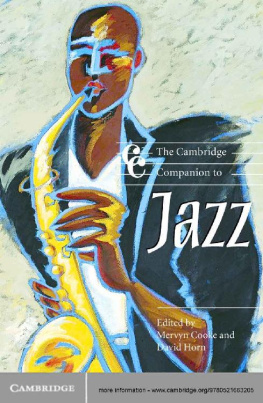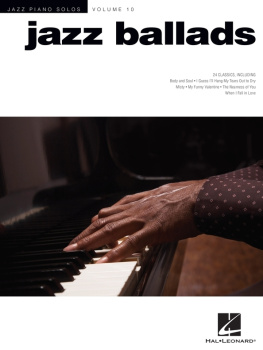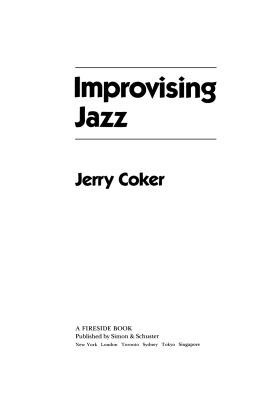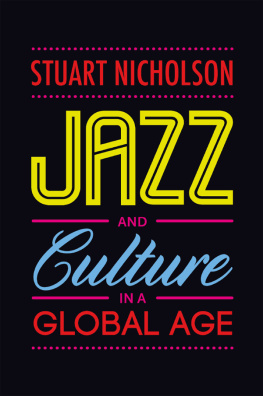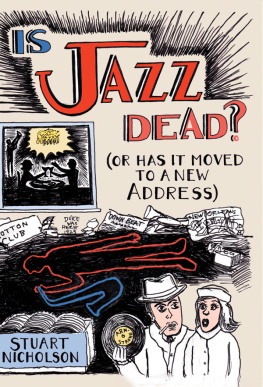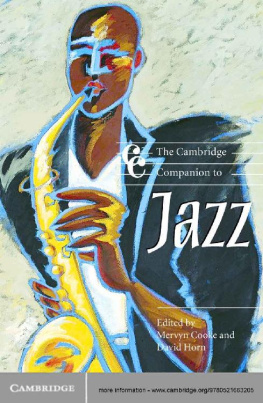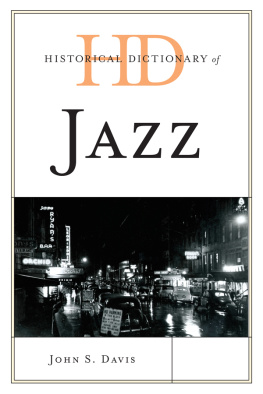
JAZZ Volume I
TRANSATLANTIC

Advisory Board

David Evans, General Editor
Barry Jean Ancelet
Edward A. Berlin
Joyce J. Bolden
Rob Bowman
Susan C. Cook
Curtis Ellison
William Ferris
John Edward Hasse
Kip Lornell
Bill Malone
Eddie S. Meadows
Manuel H. Pea
Wayne D. Shirley
Robert Walser
JAZZ Volume I
TRANSATLANTIC
The African Undercurrent in Twentieth-Century Jazz Culture
GERHARD KUBIK
University Press of Mississippi / Jackson
Publication of this volume was made possible in part by a generous donation from the Manfred Bukofzer Endowment of the American Musicological Society, funded in part by the National Endowment for the Humanities and the Andrew W. Mellon Foundation.
www.upress.state.ms.us
The University Press of Mississippi is a member of the Association of American University Presses.
Copyright 2017 by Gerhard Kubik
All rights reserved
Manufactured in the United States of America
First printing 2017
Library of Congress Cataloging-in-Publication Data
Names: Kubik, Gerhard, 1934 author.
Title: Jazz transatlantic, Volume I : the African undercurrent in twentieth-century jazz culture / Gerhard Kubik.
Other titles: African undercurrent in twentieth-century jazz culture
Description: Jackson : University Press of Mississippi, [2017] |
Series: American made music series | Includes bibliographical references and index. |
Identifiers: LCCN 2017026673 (print) | LCCN 2017029150 (ebook) | ISBN 9781626746596 (epub single) | ISBN 9781626746602 (epub institutional) | ISBN 9781626746626 ( pdf single) | ISBN 9781626746633 (pdf institutional) | ISBN 9781628462302 (hardcover : alk. paper)
Subjects: LCSH: JazzAfrican influences. | AfricansMusicHistory and criticism. | Jazz musiciansUnited States.
Classification: LCC ML3508 (ebook) | LCC ML3508 .K83 2017 (print) | DDC 781.6509dc23
LC record available at https://lccn.loc.gov/2017026673
British Library Cataloging-in-Publication Data available
CONTENTS
PREFACE
This book is about musical innovators and the hidden family relationships of their thoughts. Its title occurred to me in a kind of midnight flash of thought on March 26, 2008, after Craig Gill of the University Press of Mississippi had written to me in a letter dated February 20: I am curious about your current research.
What was my current research? It was not particularly focused. I was just out of hospital and on crutches, after a hip replacement operation on February 4, which would have to be repeated only three years later. Shortly before, however, jazz had been my principal preoccupation, in experiences with our band from southeast Africa on several concert tours to Tanzania, to the European Union, and in 2006 to Brazil. We had been learning about different peoples reactions to a kind of music they had never heard before: how they enjoyed it; how they danced to it in some places, notably in Dar es Salaam and So Paulo; how some observers were trying to find a slot in a system of preconceived categories: Was it jazz? Was it revival of South African street music of the 1950s? Why are they unplugged? Why dont they use modern instruments? Sure, this must be world music. But there are those weird harmonic patterns. And there is the twelve-bar blues form. So what?
A book on Jazz Transatlantic was a persuading idea. But what kind of book would I want to write? About our concert experiences globally? About jazz and its derivatives outside the United States? On the African side of the Atlantic? In Europe? Elsewhere?
Luckily, the word combination Jazz Transatlantic has its own iridescence. So I decided to leave things to their internal propulsion, and let the book evolve largely by itself, as if I functioned merely as an observer of the process.
As soon as I had returned to my desk in Chileka, Malawi, in June 2008, I began to work on it in the compound of Moya A. Malamusis Oral Literature Research Programme with its library, museum, and other facilities. I saw that it was a huge undertaking. The experience to be covered would need about twenty chapters balanced against one another within three large parts of the book.
During the next few years I was in contact with institutions and colleagues round the world, with musicians, notably in South Africa, with the International Library of African Music (Director: Diane Thram) at Rhodes University, S.A., and with jazz institutions in Italy, Germany, and elsewhere in Europe. In November 2011 I traveled once again to the United States, reading at the formidable library of the Center for Black Music Research, Chicago, with the wonderful assistance of Suzanne Flandreau, librarian, and in fact, the entire staff of the CBMR. I met again my oldest American friend, Donald Hopkins, author of Princes and Peasants: Smallpox in History (1983), celebrating our fiftieth anniversary of friendship (since the jazz days in Vienna 1961). I was with my good friends and colleagues Kazadi wa Mukuna, Ted and Carol Albrecht at Kent State University, Ohio, before proceeding to Philadelphia to the annual conference of the Society for Ethnomusicology, where I received honorary membership on November 19, 2011.
Almost flattened by the Jupiter-size gravitational force of the jazz literature that had accumulated worldwide by 2013beyond anything an individual can processI realized that I had to be reasonably selective. Naturally the present work is full of lacunae, and it has taken a long time to be completed. At last, however, in June 2013, I heard a sound like klook mop at the door of my house in Chileka; and a voice seemed to say: Done! Take it or Leave it! The print-out of the manuscript was on my desk.
Gerhard Kubik
Chileka, Malawi, June 30, 2013
ACKNOWLEDGMENTS
In writing Jazz Transatlantic, books I and II, I have had help from many friends and colleagues. Most of my thanks go to Yohana Malamusi, who not only retyped the entire manuscript on the computer and integrated the figures and the photography but contributed essentially to its content, resolving some pressing issues concerning jazz in South Africa. Also of great help was his sister Dayina Malamusi, who helped me establish telephone contact with jazz musicians in South Africa, such as Tete Mbambisa, Cape Town, and Johnny Mekoa, Gauteng Music Academy, Daveston. Moya A. Malamusi, head of the Oral Literature Research Programme, Chileka, Malawi, and the flutist and guitarist Sinosi Mlendo of our Malawi jazz band were to me like permanent consultants, available round the clock. During the writing process, I have repeatedly sent drafts of the chapters to colleagues and friends in many places for comments and criticism. The following have been very helpful in reading through parts of the manuscript and often also providing or pointing out additional source materials, thereby allowing me to improve my earlier drafted versions:
Lynn Abbott, Hogan Jazz Archive, New Orleans
Giorgio Adamo, University of Rome Tor Vergata
Kofi Agawu, Princeton University, Princeton
Ted Albrecht, Kent State University, Ohio
Fernando Arenas, University of Michigan, Ann Arbor
Kelly Askew, University of Michigan, Ann Arbor
Daniel Avorgbedor, Ohio State University, Columbus
Next page

